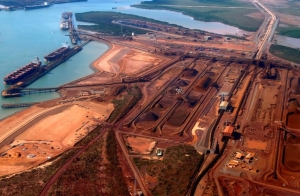


(Posted on 22/01/19)
On the release of the company’s fourth quarter results, Rio Tinto chief executive J-S Jacques said “We delivered a solid operational performance in the final quarter of 2018, in particular across our copper assets. During the year, we further strengthened our asset portfolio, continuing to invest in high quality growth. 2018 saw the early completion of Amrun, the deployment of AutoHaul, the Koodaideri and Robe River investments and the signing of the power agreement at Oyu Tolgoi. Meanwhile, we completed disposals of $8.6 billion, including the Grasberg mine in Indonesia and our remaining coal assets. With a firm ‘value over volume’ focus and disciplined allocation of capital, we will continue to progress our strategic objectives and to deliver superior returns to shareholders in the short, medium and long term.”
Pilbara iron ore shipments of 338 million tonnes (100 per cent basis) in 2018 were two per cent higher than 2017.
During the quarter, Rio Tinto announced it had successfully deployed AutoHaul at its Pilbara operations, approved a $2.6 billion investment in the Koodaideri iron ore replacement mine, and approved an investment of $1.55 billion (Rio Tinto's 53 per cent share $820 million) at two projects to sustain production capacity at the Robe River Joint Venture.
Bauxite production of 50.4 million tonnes in 2018 was one per cent lower than 2017. Third party shipments increased by two per cent to 32.8 million tonnes. During the fourth quarter, commissioning works at CBG in Guinea and the transition of operations from East Weipa to Amrun in Queensland resulted in a short term drop in production.
Aluminium production of 3.5 million tonnes was three per cent lower than 2017 due primarily to ongoing labour disruptions at the non-managed Becancour smelter in Canada.
Mined copper production of 634 thousand tonnes was 33 per cent higher than 2017, and above the guidance range, primarily reflecting strong performance at Escondida and increased production from Rio Tinto Kennecott due largely to higher grades.
Titanium dioxide slag production of 1.1 million tonnes was 15 per cent lower than 2017 due to production disruptions at Rio Tinto Fer et Titane in the second quarter, and intermittent stoppages related to labour disputes between contractors and their employees at Richards Bay Minerals in the first half.
Fourth quarter production at Iron Ore Company of Canada was four per cent higher than the fourth quarter of 2017. However, 2018 production was 20 per cent lower than 2017, due to a strike at the mine that significantly impacted second quarter production.
Other major milestones in the quarter included first bauxite shipment from Amrun, achieved six weeks ahead of schedule, and the signing of the Power Source Framework Agreement between Oyu Tolgoi and the Government of Mongolia.
The National Grain and Feed Association (NGFA) has applauded Senator Deb. Fischer’s (R-Neb.) reintroduction... Read more
Anglo American plc and Teck Resources Limited have received regulatory approval from the Government... Read more
The Rhodes Ridge Joint Venture has approved a $191 million (A$294 million) (Rio Tinto share $96 million... Read more
Trafigura Group Pte Ltd, a global leader in the commodities industry, has announced its financial results... Read more
Rio Tinto has successfully produced the first copper from the Johnson Camp mine in Arizona using its... Read more
The American Soybean Association’s World Initiative for Soy in Human Health programme and the... Read more
Karlka Nyiyaparli Aboriginal Corporation (KNAC) Registered Native Title Body Corporate and Rio Tinto... Read more
OCI Global, a leading global producer and distributor of nitrogen products has announced that it has... Read more
In December 2024, SSAB was granted a permit by the Land and Environment Court at Umeå District... Read more
The President of the Republic of Guinea has joined project partners WCS1, Baowu, Chinalco and Rio Tinto... Read more